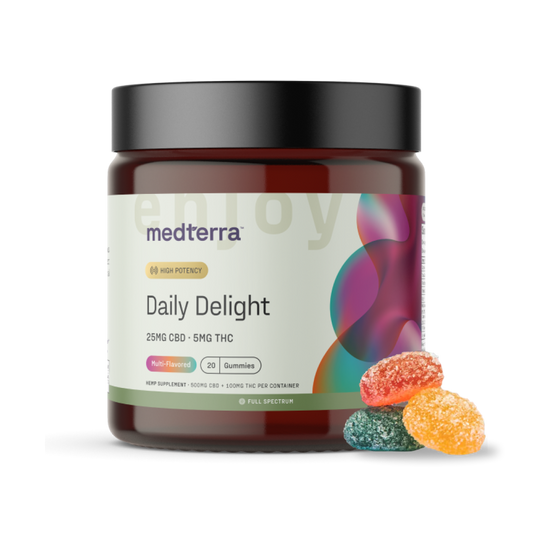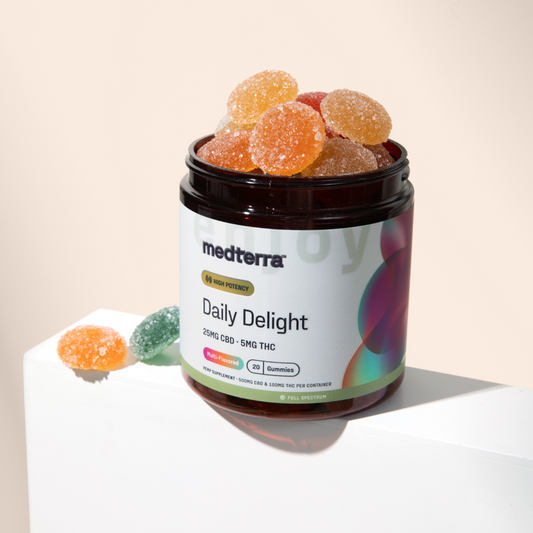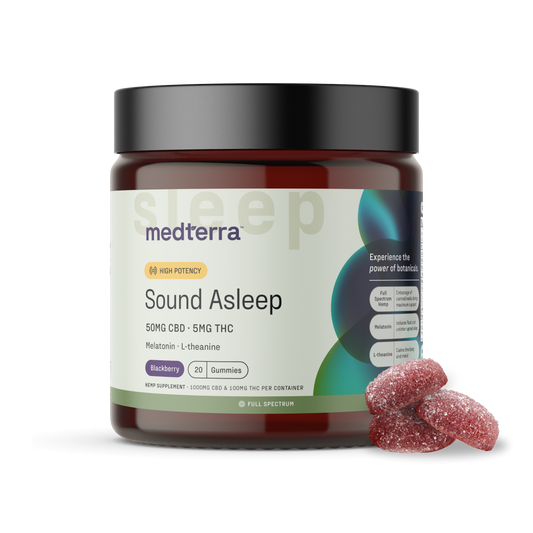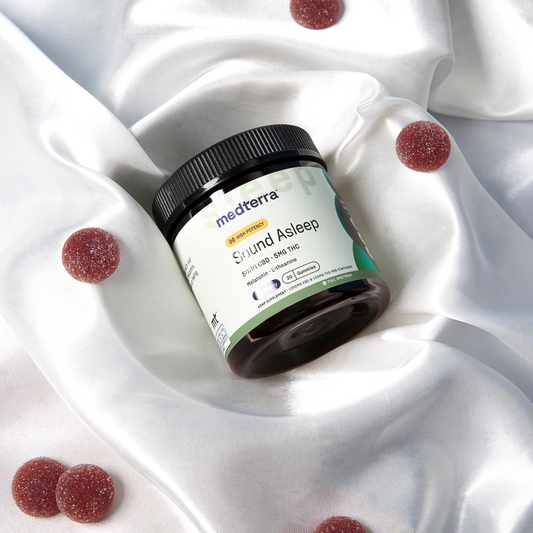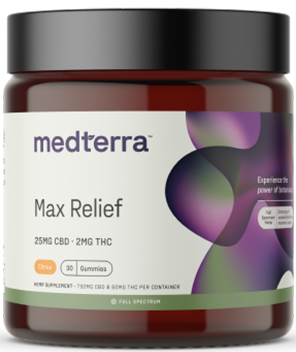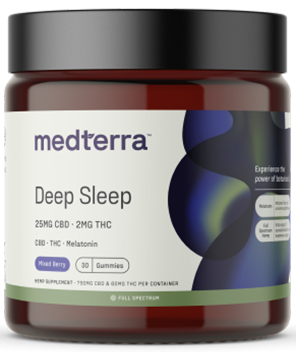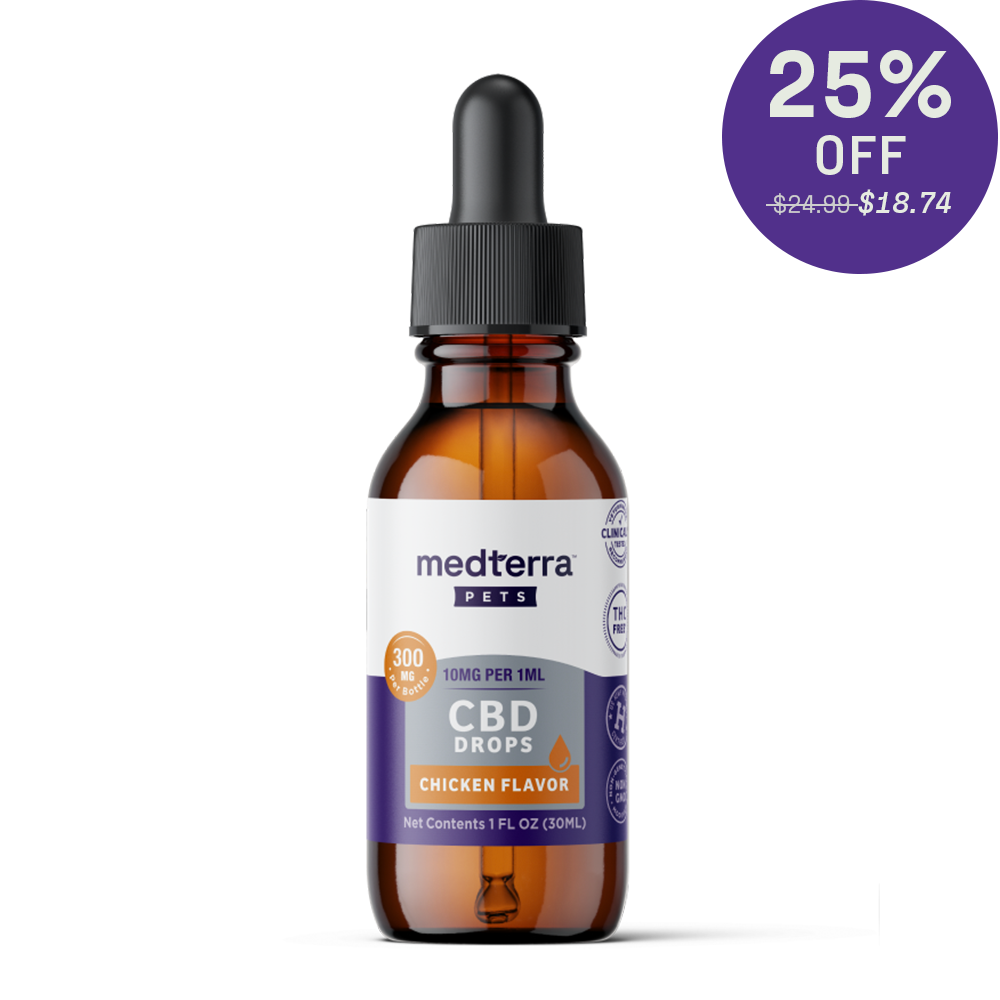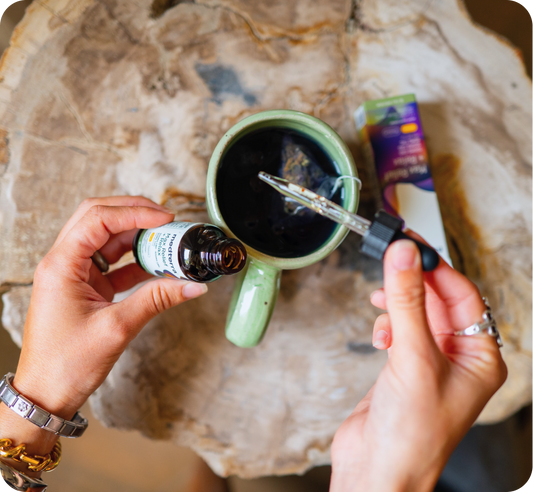You know it has strong therapeutic potential, but does CBD get you high? Customers ask us all the time, because they either:
-
Want to avoid any psychotropic effects and just use CBD for wellness purposes.
-
Are hoping to catch a buzz from our CBD products for sale.
The short answer is no - CBD itself has zero psychotropic potential, so it cannot get you high, no matter how much you use. There’s a little more nuance to this conversation, though, because not all CBD is made equal. For instance, full spectrum CBD contains trace amounts of THC - so in some cases, it can produce low-level euphoria and mind-altering effects.
Let’s take a closer look at what it means to “be high” and what CBD can and cannot do below. But whether you’re looking for CBD gummies, CBD tinctures, CBD tablets, or anything in between, shop our selection at Medterra and elevate your self-care ritual today!
Key Takeaways
-
CBD is commonly used for physical discomfort, mental tension, or overall balance.
-
Despite its strong therapeutic potential, it has zero psychotropic properties (no matter the dose) - so it won’t get you high.
-
The exception is full-spectrum CBD, which contains THC and other cannabinoids for a more well-rounded experience.
-
Whether you want the pure CBD experience or a little THC in the mix, you can shop our selection at Medterra.
Does CBD Get You High?
When we talk about a “high” from cannabis, we’re referring to being in a different state of perception. You might feel a sense of euphoria as worries melt away. Time feels slower, things sound different, and thoughts begin to wander.
It’s not just a lot of fun - the psychotropic effects of cannabis can help ease stress, support better sleep, and make social settings a lot easier for introverts. All that being said, does CBD get you high? The short answer is no.
CBD won't have you seeing sounds or hearing colors or communicating with your ancestors. CBD may not be psychotropic - but it is psychoactive. This is an important distinction:
-
Psychotropic: A substance that alters your mental state and corresponding ability to function. Psychotropic substances get you ‘high.’
-
Psychoactive: A substance that readily passes through your blood-brain barrier. Psychoactive substances don’t get you ‘high,’ but they can be uplifting.
CBD definitely falls into the latter category. Cannabinoid expert Dr. Ethan Russo agrees. According to him, “[CBD] must be considered psychoactive because of its ability to act as an anti-anxiety agent and an antipsychotic agent.”
Isolate, Broad-Spectrum, and Full-Spectrum: Why Form Matters
So does CBD get you high? The answer is no.
But some CBD products can, particularly those labeled as “full-spectrum.” This type of CBD is unique in that it includes all the compounds from hemp or marijuana - not just CBD, but THC, CBG, CBN, and tons of other minor cannabinoids. It even includes terpenes, which can shape the effects of a given cannabis strain.
On the other hand, broad-spectrum CBD contains everything from cannabis except THC. Meanwhile, CBD isolate has just CBD. Everything else is stripped out. These two forms will not get you high, no matter how much you use.
It’s worth noting that most CBD on the market falls under one of these two categories. Full-spectrum CBD products were made legally available through the 2018 Farm Bill - provided they were made from hemp and contained less than 0.3% delta-9 THC by dry weight. However, recent legislation has made CBD products containing THC harder to buy online.
What Does CBD Do to the Body and Brain, Then?
So if CBD doesn’t get you high, what’s the point? This cannabinoid still has a ton of therapeutic potential, be it CBD for sleep, relief CBD, or even CBD focus products! Let’s take a closer look at how CBD interacts with the brain.
How CBD Affects Your Brain
Early research suggested CBD only affected endocannabinoid receptors in the nervous system and vital organs (CB2 receptors). However, it turns out CBD is also quite active at endocannabinoid receptors located all throughout your brain (CB1 receptors).
That’s what the latest research says, at least. CBD doesn’t directly bind to your brain’s CB1 receptors, and that’s why it doesn’t get you high. THC is what binds strongly to these receptors. However, CBD does slightly shift their shape so that other cannabinoids can pour in.
Simple translation: CBD can’t get you high. But it can make it easier for your body to access a natural, self-produced high. Pretty cool, huh?
Other studies show that CBD can actually increase the productivity of our brain’s mitochondria. This matters because the mitochondria provide fuel for many different cognitive processes.
Potential Benefits of CBD
The subtle effects CBD has on our minds aren’t overly shocking - quite the opposite, actually.
A lot of our customers tell us their nagging problems (like mood swings or joint stiffness) become ‘mindlessly gone.’ There wasn’t necessarily a conscious change, but in retrospect, the physical and mental benefits were impossible to miss.
What makes CBD so simultaneously subtle and powerful? Once again, it's ECS activation! Once CBD is consumed, it identifies, connects with, and activates receptors, sending messages all throughout the mind and body without you even realizing it.
CBD may also help people break free from mental fog. This effect is subtle and seems to start with small improvements in serotonin signaling in the brain. Pain doctors (like Dr. James Taylor) have said patients come back feeling more hopeful after incorporating CBD into their routines.
How Do CBD and THC Work Together?
You’ll see a lot of CBD products still contain THC, and it’s not just for the fun high that comes with this dynamic duo. They influence the ECS in different ways for more well-rounded benefits.
THC binds strongly to CB1 receptors in the brain to create a noticeable high. CBD does not bind in the same way. It merely changes how those receptors respond, softening THC’s intensity and keeping the experience feeling more controlled for some people.
This is known as the entourage effect, where cannabinoids work in synergy to amplify the effects of one another. Some feel less mentally overwhelmed and more at ease physically when CBD is included with THC. Potential benefits include:
-
Sleep support
-
Physical comfort
-
Relaxation
It’s just important to dose any full-spectrum CBD products carefully, as you don’t want to end up getting “too high.” That’s no fun!
How Long Will the Effects of CBD Linger?
Your experience with CBD depends entirely on the format you choose. Gummies and capsules have to move through the digestive system, and this can take time. But, the payoff is longevity - effects can last 4-8 hours.
Meanwhile, CBD oil is taken under the tongue (sublingually), which leads to faster-acting effects. They fade a little quicker, too, sometimes lasting only 3-4 hours.
Dose size, body weight, metabolism, and whether you’ve eaten recently all play a role in how long effects last. A higher milligram serving may feel present longer simply because more CBD is circulating before the body breaks it down.
Should I Be Worried About Getting Addicted to CBD?
We get asked all the time, are CBD gummies addictive? Not at all! It doesn’t trigger the dopamine reward cycle linked to dependence. It doesn’t create withdrawal symptoms or cravings if you stop using it, either. These are key markers when defining addiction.
Bring the Benefits of CBD Into Your Routine With Medterra!
In closing, does CBD get you high? Nope - unless, of course, you’re taking full-spectrum CBD products. Otherwise, you’re just getting therapeutic benefits without any psychotropic effects.
Whether you’re trying to support better sleep, take the edge off of stress, or find a flow state so you can lock in on work, CBD can help. Medterra makes it easy to harness the potential of CBD with expertly crafted products with complementary ingredients tailored to a given goal.
All our products are lab-tested for potency and purity, and backed by world-class customer service from A to Z. Shop now and bring the benefits of CBD into your ritual!
“Excellent customer service and great products! Highly recommended…” - Wendy
“Been ordering these gummies for quite some time now. Have been extremely satisfied with all the varieties I’ve ordered and I think I’ve ordered them all. 5 Stars! Trust me, these are excellent!” - Barbara
“The products I have purchased from Medterra have truly made a difference in the pain that I live with every day.” - Angela
Related Resources
What Dosage of CBD Gummies For Sleep | Hemp Gummies vs CBD Gummies | CBD vs CBG
Frequently asked questions
Will CBD get you stoned?
No - CBD does not bind strongly to CB1 receptors the way THC does, so it doesn’t create intoxication or altered perception. Products made with isolate or broad-spectrum hemp extract contain no THC.
Why does CBD make me feel buzzed?
There’s a chance you’ve been using full-spectrum CBD products, which do contain low levels of THC - the cannabinoid that can make you feel high. Or, the products might contain CBG, another cannabinoid that can change sensory perception a bit.
How does CBD make you feel?
Most of our customers say they feel calmer with fewer racing thoughts or less physical stiffness. CBD in general is very subtle, so don’t expect dramatic effects physically or mentally.
Is CBD a hallucinogen?
Definitely not! THC doesn’t even fall under this category. A hallucinogen directly alters sensory processing and perception. CBD just interacts with the receptors linked to mood and stress response rather than pathways associated with hallucinations.
Can CBD keep you alert?
Yes, depending on dose and formulation. Lower doses or products paired with cannabinoids like CBG or ingredients such as caffeine can support focus



